"The pleasure we feel in music springs
from the obedience which is in it."
AUTHOR: Henry David Thoreau
COMPOSER
PROKOFIEV
CINDERELLA
 |
| Herbert Thomas Dicksee: Cinderella, 1906 |
CINDERELLA BALLET SUITES
Prokofiev compiled three orchestral suites:
Opp. 107, 108 and 109 from the ballet,
and also provided the following
Opp. 107, 108 and 109 from the ballet,
and also provided the following
guide to the ballet music:
"My music has three basic themes: first theme,
Cinderella, the abused and ill-treated; second
theme, Cinderella, the chaste, pure and pensive;
the third and main theme, Cinderella, in love,
radiant with happiness. I also took a great deal
of trouble to establish every character through
the music ... in such a way that the audience
felt caught up in their joys and sorrows."
CINDERELLA BALLET
SUITE NO. 1, OP. 107
Jac van Steen, Conductor
National Orchestra of Wales
CINDERELLA BALLET
SUITE NO. 1, OP. 107
1. Introduction
2. Pas de Châle
3. Quarrel
4. Fairy Godmother and the Winter Fairy
5. Mazurka
6. Cinderella Goes to the Ball
7. Cinderella's Waltz
8. Midnight
CINDERELLA BALLET
SUITE NO. 1, OP. 107
Gennadi Rozhdestvensky, Conductor
USSR Radio and TV Symphony Orchestra
CINDERELLA BALLET
SUITE NO. 2, OP. 108
1. Cinderella's Dreams
2. Dancing Lesson and Gavotte
3. Spring Fairy and Summer Fairy
4. Bourree
5. Cinderella at the Palace
6. Galop

CINDERELLA BALLET
SUITE NO. 2, OP. 108
I. Cinderella's Dreams
Gennady Rozhdestvensky, Conductor
Bolshoi Theater Symphony Orchestra
Gennady Rozhdestvensky, Conductor
Bolshoi Theater Symphony Orchestra
CINDERELLA BALLET
SUITE NO. 2, OP. 108
II. Dancing Lesson and Gavotte
Gennady Rozhdestvensky, Conductor
Bolshoi Theater Symphony Orchestra
SUITE NO. 2, OP. 108
II. Dancing Lesson and Gavotte
Gennady Rozhdestvensky, Conductor
Bolshoi Theater Symphony Orchestra
CINDERELLA BALLET
SUITE NO. 2, OP. 108
III. Spring-Fairy and Summer-Fairy
SUITE NO. 2, OP. 108
III. Spring-Fairy and Summer-Fairy
Gennady Rozhdestvensky, Conductor
Bolshoi Theater Symphony Orchestra
Bolshoi Theater Symphony Orchestra
CINDERELLA BALLET
SUITE NO. 2, OP. 108
IV. Bourree
Gennady Rozhdestvensky, Conductor
Bolshoi Theater Symphony Orchestra
CINDERELLA BALLET
SUITE NO. 2, OP. 108
V. Cinderella at the Palace
Gennady Rozhdestvensky, Conductor
Bolshoi Theater Symphony Orchestra
CINDERELLA BALLET
SUITE NO. 2, OP. 108
V. Cinderella at the Palace
VI. Grand Waltz
Theodore Kuchar, Conductor
Ukrainian State Symphony Orchestra
https://www.youtube.com/watch?v=Sj8VWAeGFQ0
SUITE NO. 2, OP. 108
V. Cinderella at the Palace
VI. Grand Waltz
Theodore Kuchar, Conductor
Ukrainian State Symphony Orchestra
SUITE NO. 2, OP. 108
VII. Gallop
Gennady Rozhdestvensky, Conductor
Bolshoi Theater Symphony Orchestra
SUITE NO. 3, OP. 109
I. Pavane
CINDERELLA BALLET
SUITE NO. 3, OP. 109
1. Pavane
2. Cinderella and the Prince
3. Three Oranges
4. Dance of Temptation
5. Oriental Dance
6. The Prince Finds Cinderella
7. Slow Waltz
8. Amoroso
CINDERELLA BALLET2. Cinderella and the Prince
3. Three Oranges
4. Dance of Temptation
5. Oriental Dance
6. The Prince Finds Cinderella
7. Slow Waltz
8. Amoroso
SUITE NO. 3, OP. 109
I. Pavane
Neeme Jarvi, Conductor
Royal Scottish National Orchestra
Royal Scottish National Orchestra
CINDERELLA BALLET
SUITE NO. 3, OP. 109
II. Cinderella and the Prince
SUITE NO. 3, OP. 109
II. Cinderella and the Prince
CINDERELLA BALLET
SUITE NO. 3, OP. 109
III. Three Oranges
Neeme Jarvi, Conductor
SUITE NO. 3, OP. 109
III. Three Oranges
Neeme Jarvi, Conductor
Royal Scottish National Orchestra
CINDERELLA BALLET
SUITE NO. 3, OP. 109
SUITE NO. 3, OP. 109
IV. Dance of Temptation
Neeme Jarvi, Conductor
Royal Scottish National Orchestra

CINDERELLA BALLET
SUITE NO. 3, OP. 109
V. Oriental Dance
Neeme Jarvi, Conductor
Royal Scottish National Orchestra
Royal Scottish National Orchestra

CINDERELLA BALLET
SUITE NO. 3, OP. 109
V. Oriental Dance
Neeme Jarvi, Conductor
Royal Scottish National Orchestra
(Unable to locate a video)
CINDERELLA BALLET
SUITE NO. 3, OP. 109
VII. Slow Waltz
Thierry Fischer, Conductor
Rundfunk-Sinfonieorchester Saarbrücken
CINDERELLA BALLET
SUITE NO. 3, OP. 109
VIII. Amoroso (Finale)
Neeme Jarvi, Conductor
Neeme Jarvi, Conductor
Royal Scottish National Orchestra
ARTICLE FROM:
PITTSBURG SYMPHONY
PITTSBURG SYMPHONY
Sergei Prokofiev
Born April 23, 1891 in Sontzovka, Russia;
Died March 5, 1953 in Moscow.
SUITE FROM CINDERELLA
SUITE FROM CINDERELLA
(1941-1944)
PREMIERE OF WORK:
PREMIERE OF WORK:
Moscow, November 21, 1945
Moscow Bolshoi Theater
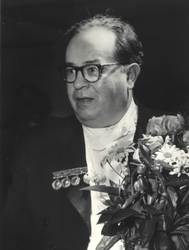 |
| Yuri Fayer |
APPROXIMATE DURATION:
45 minutes
45 minutes
INSTRUMENTATION:
piccolos, three flutes, three oboes,
English horn, three clarinets, bass
clarinet, three bassoons, contra-bassoon,
four horns, three trumpets, three
trombones, tuba, timpani, percussion,
piano, celesta, harp and strings.
trombones, tuba, timpani, percussion,
piano, celesta, harp and strings.

Immediately after the belated triumph
in Russia of his Romeo and Juliet
in Russia of his Romeo and Juliet
 |
| http://www.philatelicdatabase.com/topicals- thematics/shakespeare-on-stamps/ |
in Leningrad
 |
Anna Petrovna Ostroumova-Lebedeva:
Suspension Bridge, St. Petersburg (Leningrad)
|
(In 1914 the name of the city was changed from
Saint Petersburg to Petrograd, in 1924 to
Leningrad, back to Saint Petersburg.)
Saint Petersburg to Petrograd, in 1924 to
Leningrad, back to Saint Petersburg.)
1940, Prokofiev was commissioned
by that company to write another full-
length ballet; Cinderella
was suggested as the topic. Prokofiev
jumped at the idea, and he began the
piece early the following year. He
jumped at the idea, and he began the
piece early the following year. He
worked quickly, and had largely finished
the first two acts in short score by
early summer. Then, however, bitter
reality burst into his fantasy world.
the first two acts in short score by
early summer. Then, however, bitter
reality burst into his fantasy world.
"On 22nd June [1941],"
 |
| 22nd of June 1941: Germany Invades USSR |
he recalled in later years,
"on a warm, sunny morning, I was
installed at my work table. Suddenly,
the watchman's wife appeared and
asked me if it was true that the
Germans were attacking us and
bombing our towns. The news
staggered me. We went to
[Sergei] Eisenstein's place
 |
| David Burliuk: Sergei Eisenstein, 1932 |
[the director of Alexander Nevsky,
with whom Prokofiev had
developed a close association
developed a close association
 |
| Prokofiev and Eisenstein |
after writing the score
for that monumental film],
for that monumental film],
and discovered that it was perfectly true.
On 22nd June, 1941, the German
Fascists attacked Soviet Russia."
Under the circumstance, Cinderella
seemed frivolous and unpatriotic,
and Prokofiev put the score away in
favor of work on some military
marches and an opera based on
War and Peace,

Tolstoy's
epic that uses an earlier European
invasion of Russia as its backdrop.
Prokofiev and other artists were
evacuated to the relative safety of
evacuated to the relative safety of
Nalchik in the Caucasus Mountains
for the next two years, where, in
addition to War and Peace, he
composed his well-known Seventh
Piano Sonata, the Sonata for Flute
and Piano and the music for
Eisenstein's movie
Ivan the Terrible.
however, had not expunged
Cinderella from the Kirov's plans,
and in 1943 Prokofiev was
invited to join the company at its
temporary home in Perm.
Despite the cramped conditions and
personnel limitations in Perm, the
Kirov was still staging production
personnel limitations in Perm, the
Kirov was still staging production
(Khachaturian's Gayne Ballet
had been premiered there the
preceding December), and its
preceding December), and its
administrators told Prokofiev that
they would like to mount his ballet
before the end of the year. He
worked throughout the summer in
close collaboration with the librettist
Nikolai Volkov and the choreographer
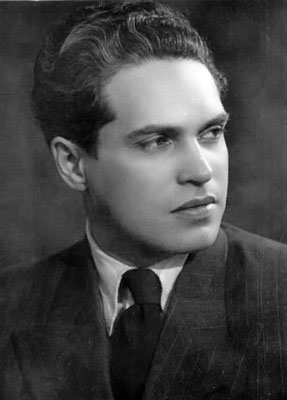 |
| Konstantin Sergeyev |
(who had danced Romeo in the
Kirov's 1940 production of Prokofiev's
masterwork), but the ballet proved to be too
Kirov's 1940 production of Prokofiev's
masterwork), but the ballet proved to be too
elaborate for the facilities available at
Perm, and it was postponed.
Perm, and it was postponed.

The orchestration was completed
during the summer of 1944 at a retreat
house in Ivanovo, near Moscow,
during the summer of 1944 at a retreat
house in Ivanovo, near Moscow,
where Prokofiev,
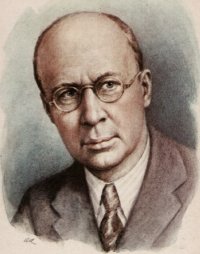

 |
| Dmitry Shostakovich |
 |
| Reinhold Gliere |
and other important composers
had been moved as the conditions
had been moved as the conditions
of war ameliorated.
great success on November 21,
1945, not by the Kirov in Leningrad,
however, but by the Bolshoi in Moscow,
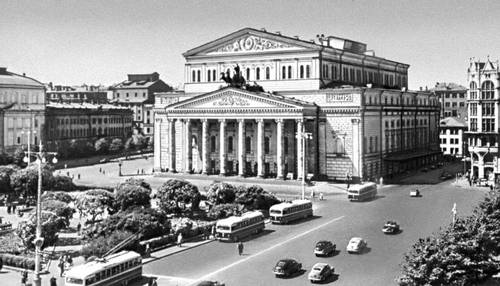 |
| Bolshoi in Moscow |
since Galina Ulanova,
 |
| Galina Ulanova |
the ballerina for whom
the title role was created,
the title role was created,
 |
| Galina Ulanova as Cinderella |
one company to the other.
 |
Jennie Harbour: Cinderella
|
"The main thing I wanted to
convey in the music of Cinderella,"
convey in the music of Cinderella,"
wrote Prokofiev,
"was the poetic love of Cinderella
and the Prince — the inception
and flowering of the emotion,
the obstacles in its way, the
realization of a dream.
A major role in my work on
Cinderella was played by the fairy-
Cinderella was played by the fairy-
tale nature of the subject, which
faced me as the composer with a
number of interesting problems
— the mysteriousness of the good
grandmother fairy,
the fantasy of the twelve dwarfs
leaping at midnight from the clock
leaping at midnight from the clock
and beating out a tap-dance reminding
Cinderella to return home, the swift
alternation of the countries of the
world visited by the Prince in search
of Cinderella, the vivid and poetic
breath of nature in the figures of the
four fairies of the seasons of the
year and their attendants
Koen Kessels, Conductor
Birmingham Royal Ballet
Birmingham Royal Ballet Sinfonia, 2010
…. Besides the dramatic structure, it
was very important to me that the ballet
was very important to me that the ballet
Cinderella should be most danceable,
that the dances should flow from the
design of the plot, be varied, and that
design of the plot, be varied, and that
the artists in the ballet should have
sufficient measure of opportunity to
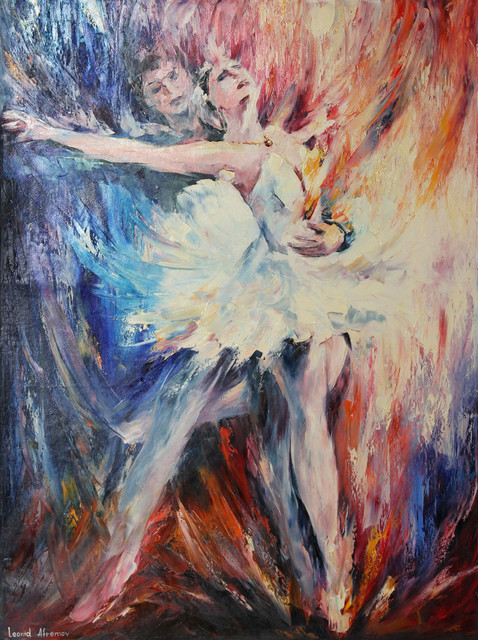 |
| Leonid Afremov: Pas de Deux II |
an adagio, a gavotte, several waltzes,
a pavane, a passepied, a bourrée,
a pavane, a passepied, a bourrée,
a mazurka, a galop. Every personage
has his variation. Although the fairy
tale of Cinderella is found among
many peoples, I wanted to take it up
as a genuine Russian fairy story."
More than just a children's story
or a bit of theatrical escapism,
or a bit of theatrical escapism,
Cinderella touches on deeper
meanings and more universal themes.
 |
| Florence Harrison: Cinderella at the Hazel Tree |
Nikolai Volkov, said that
"new images of the Prince and the
drudge [Cinderella] rose before my
eyes. The Prince acquired the
features of a passionate and
impetuous youth who longed to
escape from the confining influence
of the stagnant court life…. In our
imagination, Cinderella was
shrouded in the mists of dreams,
a girl who lived on the foretaste of
love. The result of this interpretation
of the chief characters was that the
ballet acquired the features
The fairy tale, while preserving its
mood of fantasy, was filled with a
psychological and lyrical content."
In his biography of Prokofiev,
Israel V. Nestyev wrote,
Israel V. Nestyev wrote,
"The underlying idea of the ballet
is Cinderella’s modesty, industry
and spiritual purity over the greed,
heartlessness and crass arrogance
cruel characters are derided and
humbled, and the good Cinderella
is chosen by the Prince.
Pure love is the central theme of both the
COMPLETE
CINDERELLA BALLET OP. 87
ACT I
Andrè Previn, Conductor
London Symphony Orchestra
https://www.youtube.com/watch?v=ize83QoDSb0

ACT II
Andrè Previn, Conductor
London Symphony Orchestra
ACT I
Andrè Previn, Conductor
London Symphony Orchestra
https://www.youtube.com/watch?v=ize83QoDSb0

No 1 Introduction
No 2 Shawl Dance
No 3 Cinderella
No 4 The Father
No 5 The Fairy Godmother
No 6 The Sisters' New Clothes
No 7 The Dancing Lesson
No 8 Departure of the Stepmother and the Sisters for the Ball
No 9 Cinderella Dreams of the Ball
No 10 Gavotte
No 11 Second Appearance of the Fairy Godmother
No 12 Spring Fairy
No 13 Summer Fairy
No 14 Grasshoppers and Dragonflies
No 15 Autumn Fairy
No 16 Winter Fairy
No 17 The Interrupted Departure
No 18 The Clock
No 19 Cinderella's Departure for the Ball
CINDERELLA BALLET OP. 87No 2 Shawl Dance
No 3 Cinderella
No 4 The Father
No 5 The Fairy Godmother
No 6 The Sisters' New Clothes
No 7 The Dancing Lesson
No 8 Departure of the Stepmother and the Sisters for the Ball
No 9 Cinderella Dreams of the Ball
No 10 Gavotte
No 11 Second Appearance of the Fairy Godmother
No 12 Spring Fairy
No 13 Summer Fairy
No 14 Grasshoppers and Dragonflies
No 15 Autumn Fairy
No 16 Winter Fairy
No 17 The Interrupted Departure
No 18 The Clock
No 19 Cinderella's Departure for the Ball
 |
| Arthur Rackham: Cinderella Ironing the Sisters' Linen, 1919 |
ACT II
Andrè Previn, Conductor
London Symphony Orchestra
https://www.youtube.com/watch?v=B-fabUB8HzY


CINDERELLA BALLET OP. 87
ACT III
Andrè Previn, Conductor
London Symphony Orchestra

No 20 Dance of the Courtiers
No 21 Passepied
No 22 Bourrée
No 23 Skinny's Variation
No 24 Dumpy's Variation
No 25 Dance of the Courtiers (Reprise)
No 26 Mazurka and Entrance of the Prince
No 27 Dance of the Prince's Four Companions
No 28 Mazurka
No 29 Cinderella's Arrival at the Ball
No 30 Grand Waltz
No 31 Promenade
No 32 Cinderella's Dance
No 33 Dance of the Prince
No 34 Refreshments for the Guests
No 35 Duet of the Sisters with the Oranges
No 21 Passepied
No 22 Bourrée
No 23 Skinny's Variation
No 24 Dumpy's Variation
No 25 Dance of the Courtiers (Reprise)
No 26 Mazurka and Entrance of the Prince
No 27 Dance of the Prince's Four Companions
No 28 Mazurka
No 29 Cinderella's Arrival at the Ball
No 30 Grand Waltz
No 31 Promenade
No 32 Cinderella's Dance
No 33 Dance of the Prince
No 34 Refreshments for the Guests
No 35 Duet of the Sisters with the Oranges
(musical quote from the 1919 opera L'amour des trois oranges)
No 36 Duet of the Prince and Cinderella
No 37 Waltz-Coda
No 38 Midnight
No 36 Duet of the Prince and Cinderella
No 37 Waltz-Coda
No 38 Midnight
CINDERELLA BALLET OP. 87
ACT III
Andrè Previn, Conductor
London Symphony Orchestra
https://www.youtube.com/watch?v=W2z39Y3F3Qg

LINKS
http://d.lib.rochester.edu/cinderella/text/ballet

ACT III, SCENE I
The search for Cinderella
No 39 The Prince and the Cobblers
No 40 First Galop of the Prince
No 41 Temptation
No 42 Second Galop of the Prince
No 43 Orientalia
No 44 Third Galop of the Prince
ACT III, SCENE II
The Prince with Cinderella
No 45 Cinderella's Awakening
No 46 The Morning After the Ball
No 47 The Prince's Visit
No 48 The Prince Recognizes Cinderella
No 49 Slow Waltz
No 50 Amoroso
The search for Cinderella
No 39 The Prince and the Cobblers
No 40 First Galop of the Prince
No 41 Temptation
No 42 Second Galop of the Prince
No 43 Orientalia
No 44 Third Galop of the Prince
ACT III, SCENE II
The Prince with Cinderella
No 45 Cinderella's Awakening
No 46 The Morning After the Ball
No 47 The Prince's Visit
No 48 The Prince Recognizes Cinderella
No 49 Slow Waltz
No 50 Amoroso
 |
| Edward Burne-Jones: Cinderella |
http://d.lib.rochester.edu/cinderella/text/ballet
http://en.bashopera.ru/repertoire/ballet/4022/
http://www.orchestratoronto.ca/images/Dec_5_Program_Notes.pdf
http://www.orchestratoronto.ca/images/Dec_5_Program_Notes.pdf
 |
| Aubrey Beardsley: The Slippers of Cinderella, 1894 |
CINDERELLA BALLET OP. 87
"WALTZ" AND "MIDNIGHT"
LESSON PLAN
Ann Arbor Symphony






2222222222222222222222222220073.jpg)
2222222222222222222222222220074.jpg)
2222222222222222222222222220075.jpg)
2222222222222222222222222220076.jpg)



WALTZ-CODA-MIDNIGHT
















2222222222222222222222222220080.jpg)
CINDERELLA BALLET
Part 1
Cinderella: Diana Vishneva, Dancer
The Prince: Vladimir Shklyarov, Dancer
Valery Gergiev, Conductor
Mariinsky Theatre Orchestra
CINDERELLA BALLET
Part 2
Cinderella: Diana Vishneva, Dancer
The Prince: Vladimir Shklyarov, Dancer
Valery Gergiev, Conductor
Mariinsky Theatre Orchestra
GRANADA ADV. STRINGS
1. HASTE TO THE WEDDING
2. ROCKY TOP
3. MANANITAS I/II
4. ELEANOR RIGBY
INTRO. TO INSTRUMENTS
1. THEORY: BASS CLEFa. Introduction to the Bass Clef
b. Bass Clef Worksheets
GRANADA BEG. STRINGS
1. BILE EM' CABBAGES
2. CIELITO LINDO
3. HO HEY
4. IMAGINE
2. CIELITO LINDO
3. HO HEY
4. IMAGINE
HILLVIEW ORCHESTRA
1. HASTE TO THE WEDDING
2. 21 GUNS
3. NUMB
1. HASTE TO THE WEDDING
2. 21 GUNS
3. NUMB
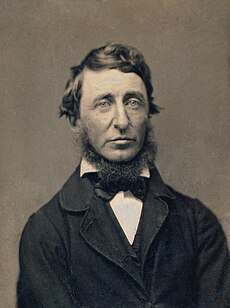

.jpg)

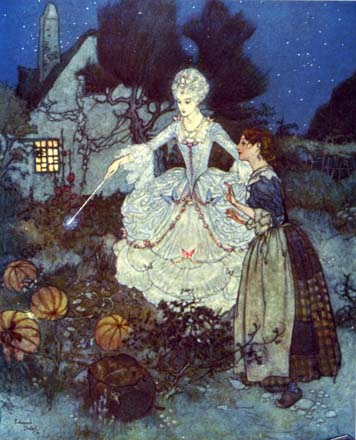






.jpg)






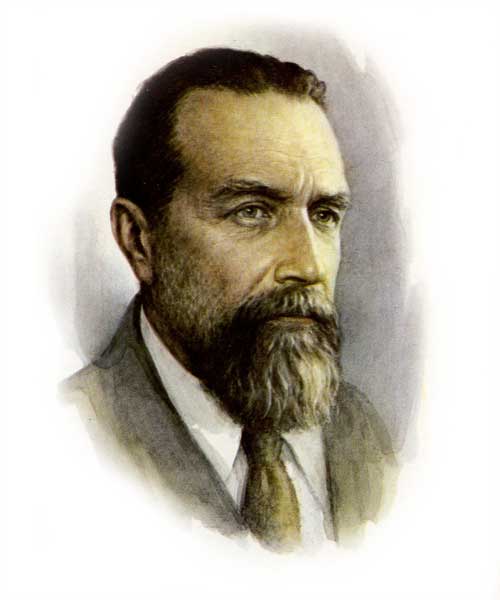






.jpg)



.png)

2222222222222222222222222220077.jpg)
2222222222222222222222222220078.jpg)
%2C%2BCinderella%2Bby%2Bthe%2BFireside%2Bwith%2Bher%2BFairy%2BGodmother.jpg)
.jpg)